|
|
|
Sort Order |
|
|
|
Items / Page
|
|
|
|
|
|
|
| Srl | Item |
| 1 |
ID:
130006
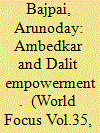

|
|
|
|
|
| Publication |
2014.
|
| Summary/Abstract |
Dr B R Ambedkar was convinced that unless the marginalized sections of Indian society secured the political power, it was not possible to completely wipe out all social, legal and cultural disabilities, from which they suffered (Desai: 1959). Thus, for the political organization and political mainstreaming of Dalits, he pleaded for their representation in legislatures in the Round Table Conferences, 1930-32, convened by the British government. Both Ambedkar and British government supported Dalit representation in the legislatures on the basis of separate electorate, which meant that in the reserved constituencies only Dalits would be allowed to vote. This was the crux of Communal Award announced by the British government in 1932.
|
|
|
|
|
|
|
|
|
|
|
|
|
|
|
|
| 2 |
ID:
130027
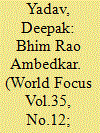

|
|
|
|
|
| Publication |
2014.
|
| Summary/Abstract |
Dr Ambedkar's legacy as a socio-political reformer had a deep effect on modern India. He believed that "political democracy without social democracy and economic justice is meaningless." In post-Independence India his socio-political thought has acquired respect across the political spectrum. His initiatives have influenced various spheres of life and transformed the way India today looks at socio-economic policies, education and affirmative action through socio-economic and legal incentives. His reputation as a scholar led to his appointment as free India's first law minister, and chairman of the committee responsible to draft a constitution. He passionately believed in the freedom of the individual and criticized equally both orthodox casteist Hindu society.
|
|
|
|
|
|
|
|
|
|
|
|
|
|
|
|
| 3 |
ID:
130031


|
|
|
|
|
| Publication |
2014.
|
| Summary/Abstract |
Woman and man have been complimentary to each other in the case of creation of a new entity in general and in continuity of the world in particular. But, ever since the dawn of human civilization, the history shows that women have been treated in almost all the societies of the world as a second-rated citizen despite the fact they constitute numerically half of the entire human population. In the past when Siddh?rtha Gautama, the Buddha and Gandhiji were dwelling on this planet, the condition of the women was not better than to-day. They were decorative pieces, object of sensual gratifications of male, and almost confined to the household work. Moreover, they were deprived of education, one of the basic necessities of mental development. In such a situation, the views expressed by the Buddha and Gandhiji could be a mirror to evaluate the place of women in the society.
|
|
|
|
|
|
|
|
|
|
|
|
|
|
|
|
| 4 |
ID:
130166
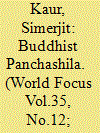

|
|
|
|
|
| Publication |
2014.
|
| Summary/Abstract |
Ever since the dawn of civilization the human beings have the tendency to live in a group, called society, which is generally made up of the people carrying diverse and divergent views and outlooks relating to different aspects of life. To maintain balance in the atmosphere of diverse views and outlooks of the people society requires some sorts of balancing force akin to lever, which plays an important role in maintaining the balance between two forces, weights, etc of a machine or instrument. Buddhism keeping in view the different aspects of human life, prescribed different modes of path or way of life to establish peaceful and equanimous society. Pañcas?la is one of them, the practice of which is important for the smooth functioning of life and also to have social equilibrium.
|
|
|
|
|
|
|
|
|
|
|
|
|
|
|
|
| 5 |
ID:
130173
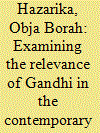

|
|
|
|
|
| Publication |
2014.
|
| Summary/Abstract |
Gandhi's form of protest and life has been resisted and criticized by many in the past and present as impossible, his teachings have led to intense debate and controversies, and this is bound to continue into the future as well. However, amidst the debate and the discussion, Gandhi's teachings are not only kept alive but are constantly produced and re-produced by those seeking to understand Gandhi and apply Gandhi, much like the myth of Gandhi which had become the savior and beacon of hope for many in pre-independent India, preventing them from losing hope under the harsh conditions that had been set up by the erstwhile British colonial rule.
|
|
|
|
|
|
|
|
|
|
|
|
|
|
|
|
| 6 |
ID:
130008
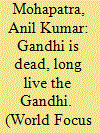

|
|
|
|
|
| Publication |
2014.
|
| Summary/Abstract |
Despite that none can refute the relevance of Gandhi. Gandhi was a man of great vision, gifted with brilliant insight and the ability to think clearly and profoundly. His thinking was truly relevant to the problems of his own time and that it continues to be relevant today, both to India and to the rest of the world. He was not only an effective leader of action but a profound thinker as well, and, therefore, that as a thinker of no small stature he is most certainly relevant to the world of thought (Quigley, 1971).
|
|
|
|
|
|
|
|
|
|
|
|
|
|
|
|
| 7 |
ID:
130172
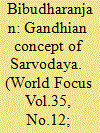

|
|
|
|
|
| Publication |
2014.
|
| Summary/Abstract |
As a practical social reformer, Gandhi noticed that inter-dining and inter-caste marriage are not going to abolish untouchability and inferiority among varnas exist. He strongly feels that the real cure lies in the change of heart. That is why, he was not enthusiastic about popularising these practices. To the questions whether inter-dining and inter-caste marriage are necessary for the removal of untouchability, his replay is both negative and affirmative. Negative because these are matters of individual concern and affirmative because, a person who refuses to take food touched by another on the plea inferiority, he is observing untouchability.
|
|
|
|
|
|
|
|
|
|
|
|
|
|
|
|
| 8 |
ID:
130185
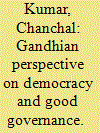

|
|
|
|
|
| Publication |
2014.
|
| Summary/Abstract |
Gandhi's concept of democracy was not confined to western democratic thoughts. It had a two-fold objective of lifting both individual and the community to a higher level where each will work and think for other. He had passionately concerned about the people of the lowest strata of the society. He wanted complete overhauling of the political system. The government of the country should act to fulfil the expectations of the people must aware of the popular will. Otherwise it will fail to meet the challenge of democracy. Defining the nature of his revolutionary government Gandhi said: "It shall be the nature of the trusts of men at the seat of power shall bow out at their failure to redeem the pledge to the people. If the men at the seat of power, after their failure to fulfil the expectation of the people in general, stick to office, the latter shall have the moral obligation, to dislodge the former."
|
|
|
|
|
|
|
|
|
|
|
|
|
|
|
|
| 9 |
ID:
130003
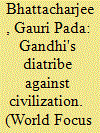

|
|
|
|
|
| Publication |
2014.
|
| Summary/Abstract |
Gandhi was opposed more to the English rule than rule by the Englishmen, and the nationalists sought to expel the Englishmen retaining the modern rule introduced by them. What was the drawback of the English rule? According to Gandhi their drawback was to bring modern civilization to India. Both the nationalists and the Mahatma sought to end British rule in India - the nationalists because it was foreign, and the Mahatma because it was modern. "It is not due to any particular fault of the English people," Gandhi asserted, "but the condition is due to modern civilization." "It is civilization only in name. Under it the nations of Europe are becoming degraded and ruined day by day," he added. And Gandhi was convinced that "if India copies England … she will be ruined." He thought that modern civilization "is eating into the vitals of the English nation," and therefore instead of blaming the English we should sympathize with them in their present distress caused by modern civilization. He was however confident that the English people would soon "cast off the evil" of modern civilization which, in his opinion, was not an "incurable disease."
|
|
|
|
|
|
|
|
|
|
|
|
|
|
|
|
| 10 |
ID:
130005
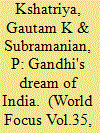

|
|
|
|
|
| Publication |
2014.
|
| Summary/Abstract |
Giving religion a place in the polity would encourage extremism and destruction leading to ultimate doom whereas for Gandhi, religion is an attitude behavior to be seen and experienced in day-to-day activities. He wanted to prove religion through morality and ultimately form a moral polity through religion. He advocated that his "kind" of religion only would keep away selfish needs from overpowering democracy. Representatives of common people who would think about their selfish needs only and public welfare will have no place in their agenda.
|
|
|
|
|
|
|
|
|
|
|
|
|
|
|
|
| 11 |
ID:
130169
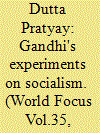

|
|
|
|
|
| Publication |
2014.
|
| Summary/Abstract |
Gandhi was a great leader and an outstanding social and religious reformer of modern India. He devoted his whole life to India's national struggle for independence from the British rule and left rich spiritual heritage to the Indian people and the people all over the world. Gandhi made criticism of the Western material civilization and persistently advocated, for using scattered rural economy to battle against centralized urban competitive economy. Gandhi placed emphasis upon the value of human beings and that of the moral psychology which was in the innermost of man's social nature and cautioned that man's greed was behind exploitation, capitalism and war.
|
|
|
|
|
|
|
|
|
|
|
|
|
|
|
|
| 12 |
ID:
130165


|
|
|
|
|
| Publication |
2014.
|
| Summary/Abstract |
Gandhi was a strong critique of modernity. In his scheme of economy, production and technology there is room for machine but that would not replace human labour and concentration of power in the hands of few. He gave primary importance to simple technology over heavy industries. Simple technology can create mass employment, whereas advanced technology can lead to vast unemployment in a country like India. Thus, he preferred production by masses over mass production by heavy machinery. He wanted that appropriate technology and ideology should go together with culture of self-control. He believed in eco-humanism and integral development of men and a decentralized socio-economic, political order at the grassroots under people's direct control. He strived for an alternative practice, which was trusteeship and that was distinctly local or relevant to specific contexts. Trusteeship alone could bring about the regeneration of India society.
|
|
|
|
|
|
|
|
|
|
|
|
|
|
|
|
| 13 |
ID:
130182


|
|
|
|
|
| Publication |
2014.
|
| Summary/Abstract |
The concept of satyagraha is a worthy concept of Gandhi and valuable contribution to political thought. This is struggle for righteousness and virtue and progressive in nature. The satyagraha is a mass action. In mass action, some time violent action will entre in spite of self- control. So is there any relevance of this in the present world? Though it seems impossible, still the relevance of this principle is visible in various place and this gives the society to exist without diminish. So everybody should try to follow satyagraha and truth for a just world. In the contemporary world, there is need to follow the philosophy of our father of nation for the establishment of a just, non-violent and peaceful society.
|
|
|
|
|
|
|
|
|
|
|
|
|
|
|
|
| 14 |
ID:
130029


|
|
|
|
|
| Publication |
2014.
|
| Summary/Abstract |
According to Kalhana's Rajatarangini, Kaniska founded many monasteries and caityas. He founded a city named Kaniskapura which has been identified with the modern Kanispur in Kashmir. Kansika erected a Great Tope which was named after him. To the west of the Tope he built a large monastery which was known as Kansika Mahavihara. Both these structures were erected at Purusapura (modern Peshawar). The Great Tope or the Kaniska Tope was magnificent structure 400 feet high, the base being in Yun and Yuan Chwang have lavished great praise on the architectural beauty of this important relic tower. The Kaniska Mahavihara, was an 'Old Monastery' at the time when Yuan Chwang visited it in the seventh century A.D.
|
|
|
|
|
|
|
|
|
|
|
|
|
|
|
|
| 15 |
ID:
130171


|
|
|
|
|
| Publication |
2014.
|
| Summary/Abstract |
Not all of Gandhi's principles may be relevant today, but most of them have universal, delicate and everlasting plea. If any part of the world would suffer from poverty, chaos, oppression, inequality and injustice, Gandhi's ethics and principles will constantly have its applicability and pertinence. Thus to survive in harmony and civil means Gandhi's ideals will always remain relevant.
|
|
|
|
|
|
|
|
|
|
|
|
|
|
|
|
| 16 |
ID:
130032


|
|
|
|
|
| Publication |
2014.
|
| Summary/Abstract |
Now, search for an alternative has generated a renewed interest in Gandhian economic thinking after the turning down of such enthusiasm of adoption of modern techniques leading to serious danger of environmental deterioration and ecological imbalances. Gandhian world view emphasized on unity of life, service to others, protection and conservation of environment long before anyone had appreciated the need for any alternative to modern economic growth. Gandhi's intuitive grasp of economic realities had led him workout the bulk of his economic programmes for the reconstruction of nation. The main stream economics completely ignores this. However, the richness of Gandhi's idea would serve its purpose if it helps to seek everyone their own Gandhi.
|
|
|
|
|
|
|
|
|
|
|
|
|
|
|
|
| 17 |
ID:
130028


|
|
|
|
|
| Publication |
2014.
|
| Summary/Abstract |
Modern world, which we are part of today has taken a long stride in the field of scientific and technological development, and inventing numerous tools to ease the life of human being, has failed to address the centuries old problems like hunger, mental agony, and various ailments and so on. A deep analysis and introspection of the root causes of these problems reveals that they are basically man-made, which could be addressed not by emphasizing exclusive reliance on the application of science and technology in our day to day life, but by applying in conjunction the various principles of Buddhism.
|
|
|
|
|
|
|
|
|
|
|
|
|
|
|
|
| 18 |
ID:
130167


|
|
|
|
|
| Publication |
2014.
|
| Summary/Abstract |
This paper tries to explore the possibilities of looking into the future of social justice in India with relation to tribals from a substantial point, rather than merely normative process. Though there is considerable amount of space for action oriented programmes for accelerating tribal's participation in the democratic spheres of our country, it is not being reflected in action, rather than in rhetoric.
|
|
|
|
|
|
|
|
|
|
|
|
|
|
|
|
| 19 |
ID:
130011
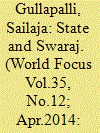

|
|
|
|
|
| Publication |
2014.
|
| Summary/Abstract |
Gandhi continues to fascinate people from all walks of life- academics, scientists, philosophers, social workers and those from civil society. The novelty of his ideas continues even after they had been forwarded a hundred years ago. In today's society, the need for revisiting Gandhian principles is being felt enormously. Perhaps the answer lies in the changing system of politics, economics, culture and also religious dimensions. That his thoughts are ever relevant needs neither mention nor elaboration. Though critics would severely disagree with this, there are views and ideas that hold true even to this day.
|
|
|
|
|
|
|
|
|
|
|
|
|
|
|
|
|
|
|
|
|